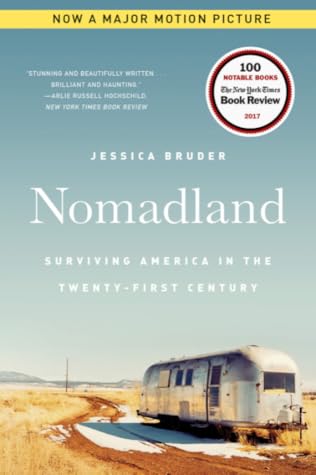More on this book
Community
Kindle Notes & Highlights
Read between
January 5 - February 19, 2022
Being human means yearning for more than subsistence. As much as food or shelter, we require hope.
There’s a contagious feeling: Something big is happening. The country is changing rapidly, the old structures crumbling away, and they’re at the epicenter of something new. Around a shared campfire, in the middle of the night, it can feel like a glimpse of utopia.
The last free place in America is a parking spot.
“The first time you sleep in your car downtown, you feel like a horrible failure or a homeless person,” she explained. “But that’s the great thing about people: We make everything habit.”
how anybody could afford to grow old. Of the many jobs she’d held in her life, none had brought even a modicum of lasting financial stability. “Never managed to get myself a pension,” she said.
According to 2015 census figures, among older women living alone, more than one in six are below the poverty line. Nearly twice as many elderly women in America are poor (2.71 million) than their male counterparts (1.49 million).
outliving men by five years on average—those dollars must stretch further into the future.
Workampers are modern mobile travelers who take temporary jobs around the U.S. in exchange for a free campsite—usually including power, water and sewer connections—and perhaps a stipend.
So many folks opt for residency in the places with the fewest hassles—Florida, South Dakota, and Texas, which lack state income taxes, are longtime favorites
Among the people I met, some had their personal savings wiped out by bad investments or saw their 401(k)s evaporate in the 2008 market crash. Some hadn’t been able to create enough of a safety net to withstand otherwise survivable traumas: divorce, illness, injury.
“If I can do the Army, I can do Amazon.” Phil
“We’re facing the first-ever reversal in retirement security in modern U.S. history,” she explained. “Starting with the younger baby boomers, each successive generation is now doing worse than previous generations in terms of their ability to retire without seeing a drop in living standards.”
Economists expect those numbers—along with the percentage of seniors in the labor force—to keep rising.
For most of human history, people worked until they died or were too infirm to lift a finger, at which point they died pretty fast anyway.
individualism. Translation: 401(k)s are vastly cheaper for companies than pension plans.
The overarching message: “You are on your own.”
Nearly half of middle-class workers may be forced to live on a food budget of as little as $5 a day when they retire, according to Teresa Ghilarducci, an economist and professor at the New School in New York City. “I call it ‘the end of retirement,’” she said in an interview. Many retirees simply can’t survive without some sort of paycheck.
CheapRVLiving.com,
drafted a sample budget stretching that pittance across life’s necessities, including allowances for food, car insurance, gas, cell service, and a small emergency fund.
You can do everything right, just the way society wants you to do it, and still end up broke, alone, and homeless.”
FreeCampsites.net, logged idyllic places in nature where visitors could stay for free, from small city parks to sprawling national forests. Another, AllStays.com, tracked businesses that allow overnight parking, from truck stops to casinos, Cabela’s sporting good outlets and Cracker Barrel restaurants. It also sold a smartphone app dedicated to “Wallydocking,” or boondocking at Walmart.
“You have a cart with fourteen tubs of Chinese junk,” she told me. “One of the depressing parts was I knew all this stuff was going to end up in a landfill.” That part demoralized her.
“You think about all the resources it took to get it there,” she mused. “And then it’s ‘Use it up. Throw it away.’”
“The older generation that has advanced degrees, they’re cleaning them out and putting techs into those positions. It’s very sad for the people who have those degrees who’ve worked so hard for them,”
Colorado Trail—more than 480 miles from Denver to Durango—nonstop for fifty-two days.
she felt less like an elf, more like a cog in the world’s largest vending machine, and the experience left her numb.
“We don’t have to live wherever people are supposed to live—that’s what it’s all about!”
you don’t have an address, you’re not a real person.
“Your fear will magnify every sound (and there are a lot of them) and you may not get much sleep. When you wake up in the morning, you will be disoriented and wonder where you are.”
(It’s sad—but not surprising—that teeth have become a status symbol in a country where more than one in three citizens lack dental coverage, which isn’t included with standard medical insurance.)
vandwellers are conscientious objectors from a broken, corrupting social order. Whether or not they chose their lifestyle, they have embraced it.


